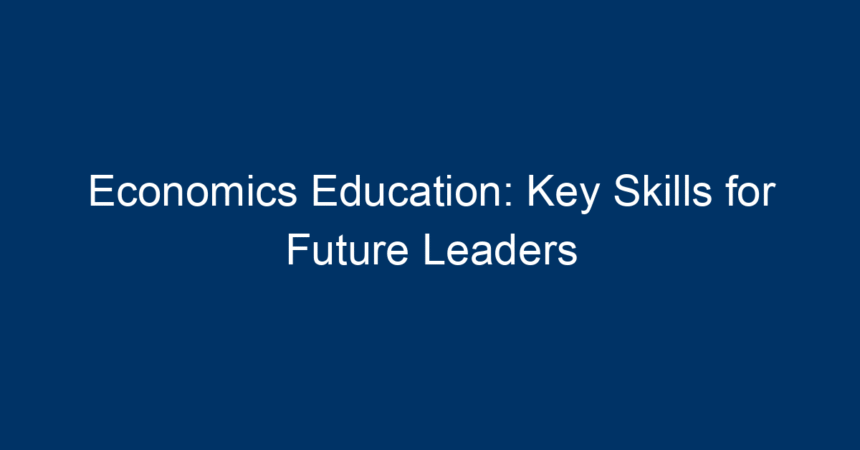In a rapidly changing global landscape, the importance of economics education cannot be overstated. As future leaders, individuals who grasp the nuances of economic principles are better equipped to tackle complex challenges, drive innovation, and navigate the intertwined worlds of business and policy. Understanding the mechanics of markets, consumer behavior, and governmental influences is critical for those aspiring to lead in any field. This article delves into the essential skills gained through economics education, guiding current and prospective students on the value of these lessons for leadership roles in the future.
The Foundation of Economics Education
Economics education provides a structured framework that helps individuals understand how societies allocate resources, produce goods, and distribute services. By studying both microeconomics and macroeconomics, students gain insights into consumer choices, market dynamics, and broader economic policies. Here’s a breakdown of the two primary branches:
Microeconomics: Understanding Individual Choices
Microeconomics focuses on the decisions made by individuals and businesses. Key aspects include:
- Consumer Behavior: Understanding how people make choices based on their preferences and constraints teaches future leaders to anticipate market needs.
- Market Structures: Knowledge of different market types—like monopolies, oligopolies, and perfect competition—enables leaders to strategize effectively.
- Supply and Demand: Recognizing how these forces interact helps leaders in pricing strategies, resource allocation, and supply chain management.
With a solid grasp of microeconomic principles, future leaders can make informed decisions that resonate with their target audience.
Macroeconomics: The Bigger Picture
Macroeconomics examines the economy as a whole, focusing on aggregate trends. This includes:
- Economic Indicators: Familiarity with GDP, unemployment rates, and inflation equips leaders to evaluate economic health.
- Fiscal and Monetary Policy: Understanding government policies and central banking actions informs strategic planning in business contexts.
- Global Economics: With globalization being a significant factor, leaders must understand international trade dynamics and the impact of global markets on local economies.
By synthesizing these concepts, economics education enhances critical thinking and strategic decision-making.
Essential Skills Developed Through Economics Education
The skills acquired through a solid economics education are vital for aspiring leaders. Here are some key competencies:
1. Analytical Thinking
A core component of economics education is the emphasis on data analysis. Leaders must:
- Interpret Data: Analyze economic reports, financial statements, and market trends to make informed decisions.
- Assess Risks: Evaluate potential risks versus rewards in various scenarios, enhancing strategic foresight.
2. Problem-Solving Skills
Economics education teaches students to approach complex problems methodically. This includes:
- Identifying Issues: Recognizing underlying economic factors affecting decisions.
- Developing Solutions: Crafting comprehensive strategies to address challenges, drawing from theoretical and empirical evidence.
3. Decision-Making Ability
Effective leaders make timely decisions based on economic data and insights. Skills developed include:
- Cost-Benefit Analysis: Weighing the pros and cons of different actions to select the best course.
- Strategic Planning: Utilizing economic models and forecasts to formulate long-term organizational strategies.
4. Communication Skills
In leadership roles, articulating economic concepts clearly is vital. Economics education enhances:
- Presentation Skills: Sharing complex ideas with diverse audiences in an understandable way.
- Negotiation Skills: Applying economic principles to reach mutually beneficial agreements.
Real-World Applications of Economics Education
The practical implications of economics education extend far beyond the classroom. Here are several examples of how leadership is informed by economic insights:
Business Management
In today’s corporate environment, leaders equipped with economics education can make more strategic decisions. For instance, understanding market demand allows businesses to adjust their offerings, align with consumer preferences, and optimize pricing strategies.
Public Policy
Economics education is crucial for those entering political offices or public sector roles. Leaders can:
- Analyze the impact of proposed policies on the economy.
- Develop economic strategies for community development.
Nonprofit Sector
In the nonprofit sphere, understanding economics helps leaders allocate resources efficiently, assess community needs, and maximize social impact, making it essential for mission-driven organizations.
The Impact of Technology on Economics Education
With the rise of technology, the landscape of economics education is changing. Online courses, simulators, and data analytics tools are making economics more accessible and engaging. Future leaders can leverage:
- Digital Learning Platforms: Accessing courses from top universities globally, enabling flexibility in learning.
- Data Analytics: Utilizing sophisticated software to analyze economic trends and consumer behavior, offering a competitive edge in any sector.
Embracing Online Learning
Embracing technology in economics education allows aspiring leaders to stay informed about real-time trends and innovative solutions, ensuring they remain relevant and capable in an ever-evolving economic landscape.
Conclusion: The Path Forward
Economics education offers a treasure trove of skills and knowledge essential for future leaders. By understanding both micro and macroeconomic principles, individuals can become adept decision-makers, strategic thinkers, and effective communicators. As the global economic environment continues to evolve, the insights gained through an economics education will be indispensable.
For those aspiring to lead, focusing on developing analytical skills, mastering decision-making frameworks, and embracing emerging technologies will lay a strong foundation for successful leadership. Investing in economics education today is not merely a choice; it’s a strategic imperative for the leaders of tomorrow.
Actionable Insights
- Engage with Economic Data: Regularly analyze reports and economic indicators to develop a data-driven decision-making process.
- Pursue Continuous Learning: Enroll in online economics courses to keep your knowledge current and relevant.
- Apply Economics in Practice: Seek internships or projects that allow you to apply economic principles in real-world scenarios.
- Network with Professionals: Join economics and business groups to exchange ideas and insights, enhancing your understanding of the field.
By prioritizing economics education, you are setting the stage not just for your individual success but for a more informed, capable future leadership landscape.




